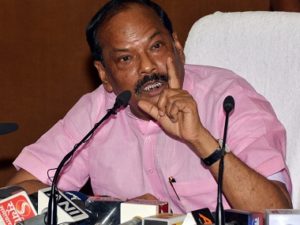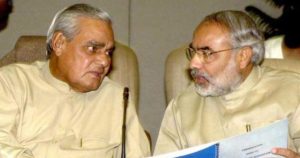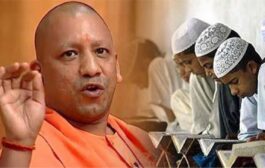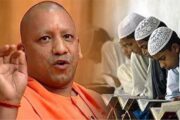A series of protests over government-sanctioned amendments on land rights, accompanied by communal clashes and mob lynching incidents, have left the state of Jharkhand shaken. Dissenting voices against chief minister Raghubar Das have strengthened over past few months — mainly due to the legislations put forward by his nearly four-year-old state government.
“We have always welcomed initiatives to build schools, hospitals and roads. But what was the need to attempt an amendment to the Chota Nagpur Tenancy (CNT) Act and the Santhal Pargana Tenancy (SPT) Act in 2016 to acquire tribal land for these purposes?” asks Babulal Marandi, president of Jharkhand Vikas Morcha (Prajatantrik) and former chief minister of Jharkhand.
“The present amendment to the Land Acquisition Act was introduced when Das was forced to scrap the proposed amendments to the CNT and SPT acts. With the deletion of the clause mandating social impact assessment, BJP is shooting itself in the foot and fanning tribal anger against the government,” Marandi adds.
The BJP-led government has denied Opposition allegations that the August 2017 amendment would help only the corporates, saying that it would instead speed up projects and hand over compensation to landowners in five months.
The amendment also meant mandatory public hearings for social impact assessment, that were to be presided over by gram sabhas before acquiring land, were done away with, relegating the opinion of the gram sabhas to an advisory role.
Party supporters and Opposition members have both condemned the land reforms, along with other unpopular measures like the government’s domicile policy, recruitment policy in Grade III and Grade IV government jobs, and the religious conversion bill.
“The chief minister should reconsider the amendments in the two land acts. Before taking such a decision, the long-term impact should have been taken into account. I also wrote a letter to him (Das) but no corrective step has been taken,” Arjun Munda, a senior BJP leader, was quoted as saying by regional daily Prabhat Khabar.
 The anger towards the BJP government worsened following a spate of mob lynching incidents in the state, allegedly over cow vigilantism, along with multiple communal clashes as well. Apart from this, the government is also facing extreme resistance from tribals in Khunti, which is one of four districts in the state where the Pathalgadi agitation rages.
The anger towards the BJP government worsened following a spate of mob lynching incidents in the state, allegedly over cow vigilantism, along with multiple communal clashes as well. Apart from this, the government is also facing extreme resistance from tribals in Khunti, which is one of four districts in the state where the Pathalgadi agitation rages.
Pathalgadi agitation
Activists have erected stone inscriptions quoting the Fifth Schedule of the Constitution and have barred entry of government officials and outsiders in over 200 villages in four districts of Jharkhand, declaring their gram sabhas as sovereign territory. The government’s knee-jerk response included brushing off the protests and using heavy force on the activists.
Interestingly, Khunti — the hotbed of the present tribal unrest — has been a BJP bastion since the Jana Sangh days. Sitting Lok Sabha MP Kariya Munda has served twice as a Cabinet minister as a former deputy Speaker of the Lok Sabha. Neelkanth Singh Munda, who is considered close to Das and who proposed his name as chief minister, is also a serving member of the state Assembly from Khunti.
“Pathalgadi is a manifestation of the tribal anger against the government. Instead of talking to people, the government is playing politics by making it a Church versus Sarna (tribal) issue. They want to brand them as rebels and that is why the issue has blown up. Raghubar Das has so far acted as an agent of Narendra Modi rather than ensuring the state’s welfare,” says senior Congress leader and former Ranchi MP Subodh Kant Sahay.
The state government also saw vehement protests within its fold when Sudesh Mahto, president of the All Jharkhand Student Union and part of the ruling dispensation, publicly denounced the government’s domicile policy that was introduced in April 2016, followed by the proposed amendments to the CNT and SPT acts. The government was forced to withdraw the contentious bill after a series of strikes. The governor returning the bill for reconsideration was the final nail in the coffin, and caused huge embarrassment to the chief minister’s ambition to create a land bank.
“The chief minister should have consulted the rank and file of his own party in addition to its alliance partners. Domicile policy, recruitment policy and land acquisition are all issues directly impacting the tribals as well as the moolvasis (residents) in the state. Repeated attempts to attack laws enacted to safeguard tribal welfare has left them suspicious of the government’s motives,” Mahto had said.
Furthermore, 24 of the 43 BJP MLAs in the state had written a letter to the Speaker in January this year, demanding a special committee be formed to look into anomalies in the domicile policy. The way Das handled dissent towards his policies has also dented his image as an administrator. “Raghubar Das always had the traits of an arrogant and dominating leader. The party and government merged as one during his tenure and all decisions are being taken in the chief minister’s house,” says Chandan Mishra, political editor of a prominent national daily published from Ranchi.
“Even his own party MLAs and officials avoid him because of his temper. I believe Das has squandered the opportunity he had as head of a majority government. He has alienated almost all sections of the society — be it the moolvasis or Christians or Sarna tribals — by introducing controversial laws like domicile policy and Religious Freedom Bill, 2017,” Mishra added.
Divide and rule?
The arrest of 14 missionaries from Pakur last week over allegations of forced conversion under the controversial Religious Freedom Act, 2017, along with the arrest of a priest for allegedly abetting the gang-rape of five social workers in Khunti recently, have exposed attempts to open another fault line by pitting Christian tribals and missionaries against RSS-backed Sarna tribals.
The Economic Times, while reporting on the RSS vs Church equation in 2017, had said the Sangh’s activities in Christian tribal areas has caused friction the two.
But the arrests of the 14 missionaries are the first ones under the Act which imposes a three-year imprisonment and a Rs 50,000 fine for converting people through “allurement” or coercion”. In case of conversion of a minor, the jail term can go up to four years and the fine is Rs 1 lakh. The Act stipulates that the person doing the conversion must inform the deputy commissioner of the district in advance about the date, place and time of the conversion. It is also mandatory to reveal the identity of the person who will administer the conversion.
A day before the bill was approved by the state Cabinet, the state government came out with full page advertisements featuring a picture of Mohandas Gandhi and a quote warning tribals of the mal-intentions of the Christian missionaries. The blatant attempt to use taxpayer money to instigate two communities and foment hatred was widely condemned.
“Though the government initially went after the Muslim community, it has now been actively targeting Christian institutions as well by attempting to polarise converted and Sarna tribals in the state. The arrest of 14 people in Pakur is the first serious action taken under the new law and important because Santhal Pargana has been a stronghold of both the Sorens of Jharkhand Mukti Morcha and Babulal Marandi as well. Instead of placating tribals, Das’ BJP government is instead planning to end reservation benefits to tribals who have converted to Christianity or other religion. This is bound to create a deeper schism among the tribal community,” explained Chandan.
Currently, all tribals are entitled to a caste certificate which makes them eligible for statutory benefits like reservation in government jobs, education and medical treatment. The government is considering changing the format of this certificate in order to exclude converted tribals. However, there are some who consider this a legacy handed down by previous Jharkhand governments, a factor of the political instability the state has always faced since its foundation in 2001.
“While the attempt to amend the CNT-SPT Act was ill-advised and its withdrawal was a huge setback for Raghubir Das’ position within the party, people must understand that it takes a strong government to take controversial decisions. Domicile policy was pending since 2002 when Babulal Marandi refused to bite the bullet and deferred a decision,” said Vijay Pathak, resident editor of Prabhat Khabar.
There is also a perceived lack of communication between the government and tribals, adding to BJP’s list of problems in the state. “There is definitely a huge communication gap between those on the chair and the people. They should explain how this happened when the hard work done by party workers gave them such a majority government to run. The party is still doing its bit, but it’s for the government to listen to people’s genuine concerns and address them,” said former chief minister and BJP stalwart Arjun Munda.
Anticipating damaging repercussions ahead of crucial polls, BJP’s central leadership has been making efforts to contain the negative perception regarding the government.
Party president Amit Shah met tribal intellectuals and had deliberations with Arjun Munda and Raghubir Das during his Ranchi visit on 11 July. The agenda of the meeting was to fine-tune the party’s strategy in a crucial election year.
source: Firstpost.com








































